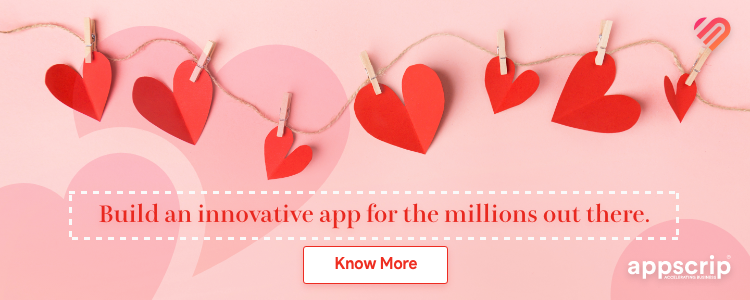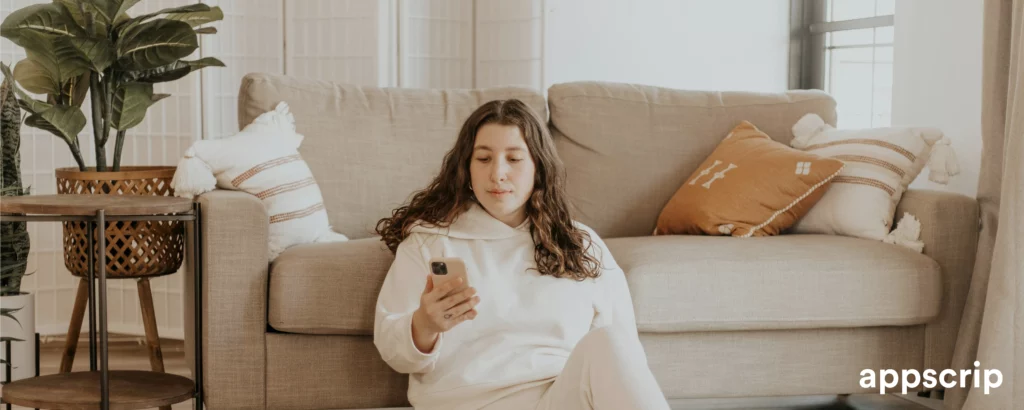The digitally inclined world has adopted a digital-first dating culture with apps helping people find mates and cultivate healthy relationships. There’s a conceivable shift from casual swiping to meaningful conversations, and that’s exactly where Hinge has parked itself.
Unlike many of its competitors, Hinge is designed to be deleted—encouraging real world connections that go beyond the superficial.
Whether you’re a startup aiming to disrupt the dating space or an entrepreneur looking to launch the next big consumer product, building a Hinge-style app is both a lucrative and a rewarding gambit.
So here’s a comprehensive guide on how to build a dating app like Hinge.
Why Build a Dating App like Hinge?
Hinge has carved a niche for itself by prioritizing meaningful connections over casual encounters. Its standout features—such as prompting users to like or comment on specific profile sections—resonate with users seeking depth and compatibility over non-committal swipes.
According to Statista and market projections for 2025:
- 💰 Global revenue in the dating app segment is expected to hit $8.7 billion in 2025.
- 📈 The market is projected to grow at a CAGR of 2.49% between 2025–2029, and reach $9.63 billion by 2029.
- 👥 By 2029 the number of dating app users worldwide is projected to reach 413.6 million.
These figures indicate the enduring appeal and scalability of apps that focus on long-term, value-based interactions.
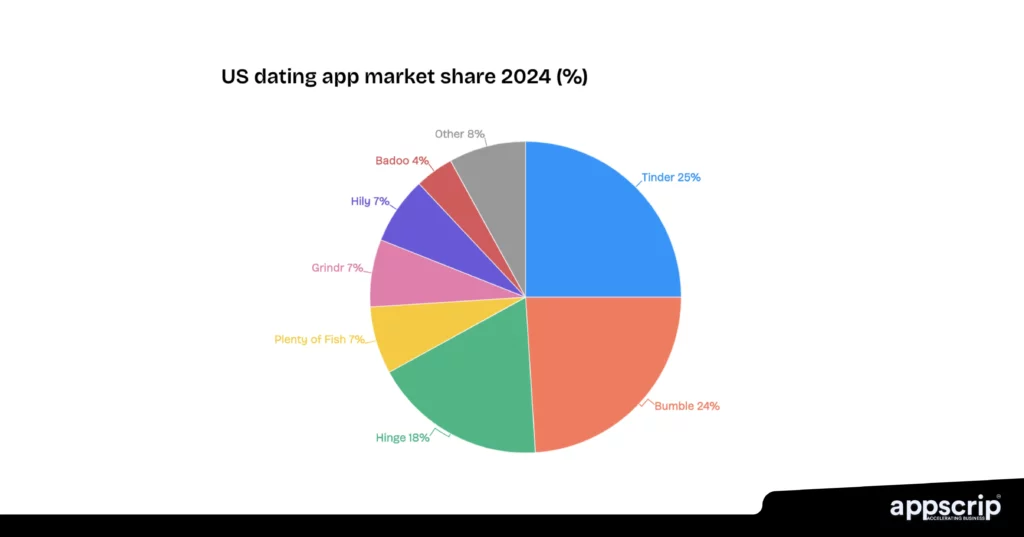
How to Build a Dating App Like Hinge?
Building a dating app like Hinge in 2023 requires a meticulous understanding of the latest technologies and user trends. You’ll need to incorporate modern design elements, advanced algorithms for matching, and robust security features to ensure user privacy and safety.
Entrepreneurs of businesses looking to build a dating app like Hinge that will provide users with a seamless experience, have the approaches:
- Native app development
- Web app development
- Hybrid app development
| Characteristics | Web app | Hybrid app | Native app |
| Usage | Access directly from a browser | Have to install the app on their device first | Have to install the app on the device |
| Internal working | Client code in the browser communicates with remote server-side code and databases | Client code and browser code wrapped in a native shell or container | Client code written in tech & language specific to the device or platform where installed |
| Native device features | Not accessible | Accessible | Accessible |
| User experience | Inconsistent & dependent on the browser used | Consistent and engaging | Consistent and engaging |
| Access | Limited by browser and network connectivity | One-step access with offline features | One-step access with offline features |
| Performance | Slower and less responsive | Faster, but may use more battery power | Performance can be optimised to device |
| Development | Cost-efficient, quick time to market | Cost-efficient, quicker time to market | Expensive, higher time to market |
How Much Does It Cost to Build a Dating App Like Hinge?
The cost to build a dating app like Hinge can vary depending on factors such as complexity of features, development time, and the team’s hourly rate. A rough estimate for developing a dating app like Hinge is shown above.
| Region | Hourly Rate | Estimated Cost Range |
| India / Vietnam | $20–$40/hr | $15,000–$30,000 |
| Eastern Europe | $40–$70/hr | $25,000–$45,000 |
| Western Europe | $70–$100/hr | $40,000–$70,000 |
| US / Canada | $100–$200/hr | $60,000–$150,000+ |
Integrating advanced features such as AI-driven matching algorithms, video chat, and enhanced security measures can increase the overall development cost.
Detailed Cost Breakdown to Build a Hinge-like App
| Feature/Module | Estimated Hours | Hourly Rate ($25–$40) | Estimated Cost (USD) |
| UI/UX Design (Web + Mobile) | 120–160 | $4,000–$6,400 | $5,200 |
| User Authentication (OTP, OAuth) | 40–60 | $1,500–$2,400 | $2,100 |
| User Profile + Preferences | 60–80 | $2,500–$3,200 | $2,800 |
| Matching Algorithm | 80–120 | $3,000–$4,800 | $3,900 |
| Chat Module (Text + Media) | 80–100 | $3,000–$4,000 | $3,500 |
| Video/Voice Call Integration | 40–60 | $1,500–$2,400 | $1,900 |
| Admin Dashboard | 50–70 | $1,500–$2,800 | $2,000 |
| Third-party APIs (Twilio, AWS) | — | $400–$800/month | Recurring |
| Total Development Cost | 500–650 hrs | $17,400–$26,800 | $22,100 |
Note: This estimate is based on offshore development rates (as in India, Vietnam, Eastern Europe) where average hourly rates stand in between $25–$40/hr. While the costs in Western Europe or the U.S. could go upwards of 3x–4x.
This estimate assumes:
- A minimum viable product (MVP) version of a Hinge-like app
- Core features only (profile, onboarding, matching, chat, basic video/voice support, admin panel)
- No complex AI/ML matching or heavy custom animations
- A small, agile development team
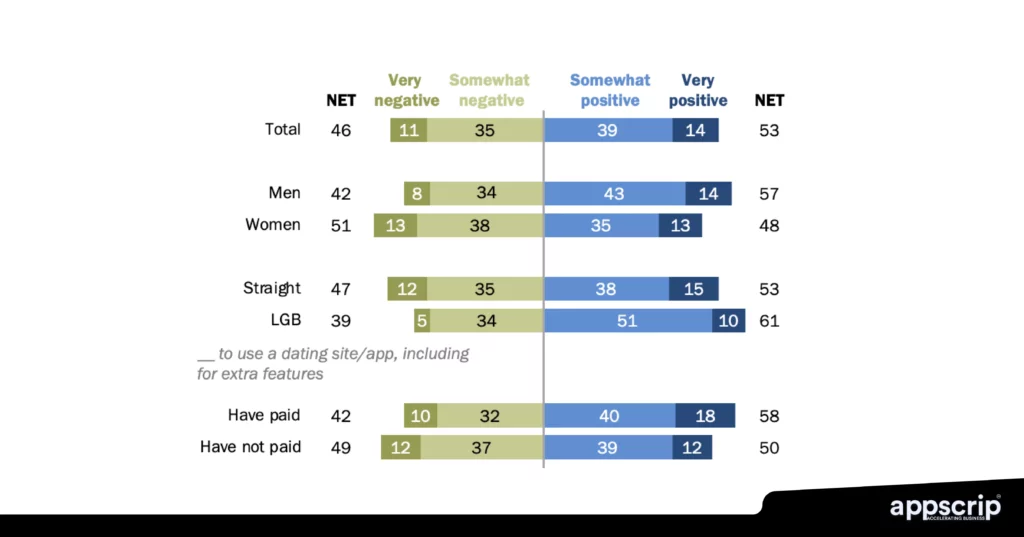
What online dating users say they regarding their experience with dating apps. And the percentage of paid users.
What Are Clone Apps / Pre-Built Apps
Clone apps are mobile applications built by replicating the features, functionalities, and sometimes the UI of existing successful apps. These apps are typically developed by entrepreneurs or businesses looking to capitalize on the proven success of an established app or launch a customized version tailored to a specific audience or use case.
Clone apps are usually based on pre-built frameworks, allowing for quicker development and lower costs compared to building an app from scratch.
There are several reasons why someone might want to build a clone app as in:
- To capitalize on the success of an existing app.
- To create a customized version of an app.
- To test latest features and functionality.
There are a few advantages to building a clone app.
- Reduced development costs.
- Reduced development time.
- Existing user base.
- Easy to market.
| Feature | Clone App / Pre-built Apps | Custom App |
| Cost | Relatively lower cost | Higher cost |
| Time to Market | Quick deployment due to pre-built frameworks | Longer development timeline due to unique requirements |
| Tech Stack | May not support modern technologies like Kubernetes, Docker, etc. | Can seamlessly integrate the latest technologies, including Kubernetes, Docker, and more |
| Maintenance & Support | Often limited to initial setup with minimal post-sales support | Usually includes ongoing maintenance and dedicated post-launch support |
| Code Quality | Code may lack structure, readability, or proper documentation | Emphasis on high-quality code with thorough documentation and clean architecture |
| Scalability | Might face limitations in scaling due to rigid architecture | Built to scale efficiently as user base and features grow |
How to Monetise A Dating App Like Hinge?
There are various monetization strategies you can employ for your dating app, like Hinge.
Here’s the popular monetization strategies you can inculcate while you build a dating app like Hinge:
Advertising – this monetisation strategy is universally applied. You can integrate different ads in the app and get money for ads view, click-through rate, etc.
Freemium model – this monetisation strategy is quite common where users can avail additional features by paying for it.
In-app purchases –This feature can help you earn revenue via commission from local companies you may work with.
Account boost – for users interested in promoting their account and aiming to show-up more in search results, this paid option will assist.
Sponsorships – after an app gains popularity, this monetisation strategy can be adopted.
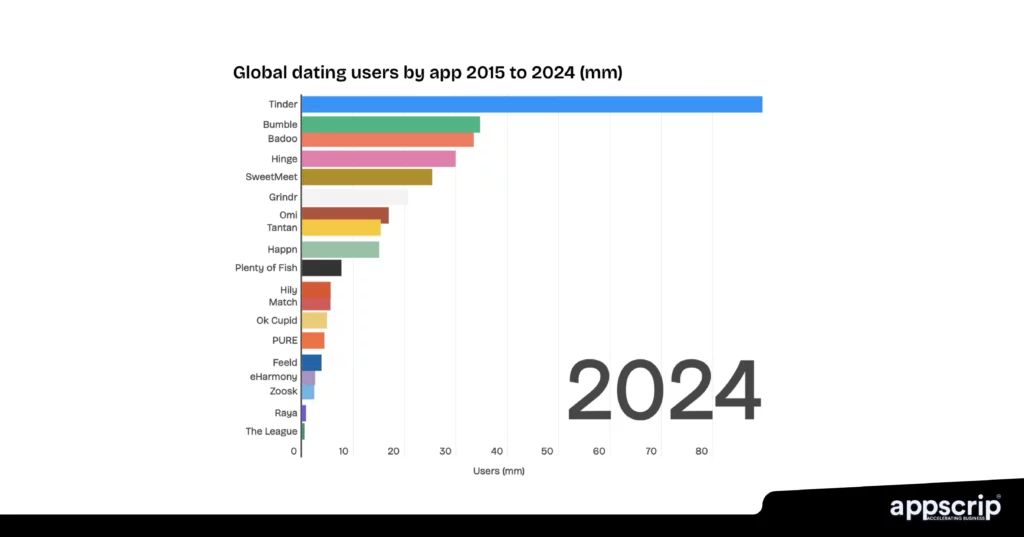
Creating a Custom Dating App Like Hinge
Creating a custom dating app like Hinge involves meticulous planning, thorough market research, and a deep understanding of user preferences. You’ll need to identify the unique features that set your app apart from competitors while prioritizing user experience and security.
Customizing the app’s interface, incorporating interactive elements, and fostering user engagement are key to building a successful dating platform that resonates with your target audience.
Factors That Influence the Cost To Build a Dating App Like Hinge
Several factors can influence the overall cost to develop a dating app like Hinge. These include:
- Complexity of features and functionality
- Integration of advanced security measures and privacy protocols
- Customise UI and UX
- Inclusion of AI-driven matching algorithms and data analytics
- Cross-platform compatibility and scalability
- App maintenance and future updates
Understanding these factors and allocating resources accordingly can help you optimize the development process and create a robust dating app that aligns with your business objectives.
Essential Tech Stack For A Dating App
Evaluate your specific needs and consider factors like scalability, security, and compatibility while selecting a tech stack.
| Component | Recommended Tech Stack |
| Frontend (Mobile) | React Native or Flutter |
| Backend | Node.js, Django, or GoLang for real-time concurrency |
| Real-time Chat | Firebase, Sendbird, or Stream |
| Video/Voice Calling | Twilio, Agora, or WebRTC |
| Database | PostgreSQL (relational data), Redis (caching), ElasticSearch |
| Match Engine | Microservice using Python, TensorFlow or Scikit-learn |
| Queueing & Scaling | Kafka or RabbitMQ + Kubernetes (auto-scaling) |
| Deployment | AWS (EC2, RDS, S3, CloudFront) or GCP |
Security & Compliance
- 🔐 End-to-end encryption using AES-256 for data at rest, TLS for in-transit communication.
- 👮 AI-driven content moderation (e.g., nudity filters, hate speech classifiers).
- ✅ GDPR & CCPA-compliant: Consent tracking, right to be forgotten, data export tools.
- 🧠 Fraud detection through behavioral anomaly detection and device fingerprinting.
Building for scale also means ensuring load balancing, fault tolerance, and uptime SLAs of 99.9%+ through robust cloud infrastructure.
Technical Depth: Matching Logic, Scalability & Security
Matching Algorithm (Hinge-style)
At its core, Hinge’s algorithm mimics real-world matchmaking by prioritizing mutual compatibility, engagement quality, and behavioural signals. A basic weighted score model can look like this:
Compatibility Score = (Interest Match x 0.4) + (Prompt Engagement x 0.3) + (Behavioral Score x 0.3)
- Interest Match: Shared preferences and lifestyle compatibility.
- Prompt Engagement: Users who engage with profile prompts more actively are likely more intentional.
- Behavioral Score: Tracks depth of conversation, reply rates, and app usage frequency.
Advanced Matching Techniques:
- ELO-based ranking system (used by Tinder) to show most desired profiles more often.
- Machine learning models to improve match suggestions based on previous likes and rejections.
- Collaborative filtering to cluster users with similar behavior and match preferences.
Conclusion
In conclusion, to build a dating app like Hinge requires a strategic approach, incorporating innovative features, robust security measures, and a user-friendly interface.
By understanding the market landscape, implementing effective monetisation strategies, and prioritising user experience, you can create a successful dating platform that resonates with users seeking genuine and meaningful connections in the digital realm.
Appscrip has an able software solution, with the innovative features and pragmatic monetising possibilities included. Want to know more, get in touch.
